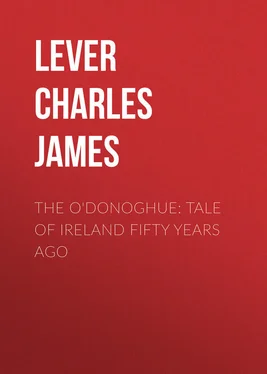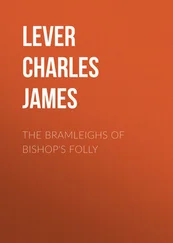Charles Lever - The O'Donoghue - Tale of Ireland Fifty Years Ago
Здесь есть возможность читать онлайн «Charles Lever - The O'Donoghue - Tale of Ireland Fifty Years Ago» — ознакомительный отрывок электронной книги совершенно бесплатно, а после прочтения отрывка купить полную версию. В некоторых случаях можно слушать аудио, скачать через торрент в формате fb2 и присутствует краткое содержание. Издательство: Иностранный паблик, Жанр: literature_19, foreign_antique, foreign_prose, на английском языке. Описание произведения, (предисловие) а так же отзывы посетителей доступны на портале библиотеки ЛибКат.
- Название:The O'Donoghue: Tale of Ireland Fifty Years Ago
- Автор:
- Издательство:Иностранный паблик
- Жанр:
- Год:неизвестен
- ISBN:нет данных
- Рейтинг книги:4 / 5. Голосов: 1
-
Избранное:Добавить в избранное
- Отзывы:
-
Ваша оценка:
- 80
- 1
- 2
- 3
- 4
- 5
The O'Donoghue: Tale of Ireland Fifty Years Ago: краткое содержание, описание и аннотация
Предлагаем к чтению аннотацию, описание, краткое содержание или предисловие (зависит от того, что написал сам автор книги «The O'Donoghue: Tale of Ireland Fifty Years Ago»). Если вы не нашли необходимую информацию о книге — напишите в комментариях, мы постараемся отыскать её.
The O'Donoghue: Tale of Ireland Fifty Years Ago — читать онлайн ознакомительный отрывок
Ниже представлен текст книги, разбитый по страницам. Система сохранения места последней прочитанной страницы, позволяет с удобством читать онлайн бесплатно книгу «The O'Donoghue: Tale of Ireland Fifty Years Ago», без необходимости каждый раз заново искать на чём Вы остановились. Поставьте закладку, и сможете в любой момент перейти на страницу, на которой закончили чтение.
Интервал:
Закладка:
“The boy is worse – far worse,” whispered a low, but distinct voice beside him. “His head is now all astray – he knows no one.”
Doctor Roach seemed vexed at the ceremony of salutation being forgotten in Sir Archibald’s eagerness about the youth, and drily answered —
“I have the honour to see you well, sir, I hope.”
“There is one here very far from well,” resumed Sir Archy, neither caring for, nor considering the speech. “We have lost too much time already – I trust ye may na be too late now.”
The doctor made no reply, but rudely taking the candle from his hand, walked towards the bed —
“Ay, ay,” muttered he, as he beheld the lustrous eyes and widespread pupils – the rose-red cheek, and dry, cracked lips of the youth; “he has it sure enough.”
“Has what? – what is it?”
“The fever – brain fever, and the worst kind of it too.”
“And there is danger then?” whispered M’Nab.
“Danger, indeed! I wonder how many come through it. Pshaw! there’s no use trying to count his pulse;” and he threw the hand rudely back upon the bed. “That’s going as fast as ever his father went with the property.” A harsh, low, cackling laugh followed this brutal speech, which demanded all Sir Archy’s predetermined endurance to suffer unchecked.
“Do you know me?” said the doctor, in the loud voice used to awaken the dormant faculty of hearing. “Do you know me?”
“Yes,” replied the boy, staring steadfastly at him.
“Well, who am I, then? Am I your father?”
A vacant gaze was all the answer.
“Tell me, am I your father?”
No reply followed.
“Am I your uncle, then?” said the doctor, still louder.
The word, “uncle,” seemed to strike upon some new chord of his awakened sense: a faint smile played upon his parched lips, and his eyes wandered from the speaker, as if in search of some object, till they fell upon Sir Archy, as he stood at the foot of the bed, when suddenly his whole countenance was lighted up, and he repeated the word, “uncle,” to himself in a voice indescribably sweet and touching.
“He has na forgotten me,” murmured M’Nab, in a tone of deep emotion. “My ain dear boy – he knows me yet.”
“You agitate him too much,” said Roach, whose nature had little sympathy with the feelings of either. “You must leave me alone here to examine him myself.”
M’Nab said not a word, but, with noiseless step, stole from the room. The doctor looked after him as he went, and then followed to see that the door was closed behind. This done, he beckoned to Kerry, who still remained, to approach, and deliberately seated himself in a chair near the window.
“Tell me, my good fellow,” said he, affecting an air of confidence as he spoke, “an’t they all broke here? Isn’t the whole thing smashed?”
“Broke – smashed!” repeated Kerry, as he held up both hands in feigned astonishment; “‘tis a droll smash: begorra, I never see money as plenty this many a year. Sure av there wasn’t lashings of it, would he be looking out for carriage-horses, and buying hunters, not to say putting the kennel in order.”
“Is it truth you are telling?” said Roach, in astonishment.
“True as my name is Kerry O’Leary. We offered Lanty Lawler a hundred and twenty guineas on Friday last for a match wheeler, and we’re not off of him yet; he’s a big brown horse, with a star on his face; and the cob for the master cost forty pounds. He’ll be here tomorrow, or next day, sure ye’ll see him yourself.”
“The place is falling to ruin – the roof will never last the winter,” broke in the doctor.
“Well, and whose fault is it, but that spalpeen Murphy’s, that won’t set the men to work till he gets oak timber from the Black Say – ‘tis the finest wood in the world, they tell me, and lasts for ever and ever.”
“But, don’t they owe money every where in the country? There isn’t a little shop in Killarney without an account of their’s in it.”
“Of course they do, and the same in Cork – ay, and in Tralee, for the matter of that. Would you have them not give encouragement to more places nor one? There’s not one of those crayturs would send in their bill – no, though we do be asking for it, week after week. They’re afraid of losing the custom; and I’ll engage now, they do be telling you they can’t get their money by hook or by crook; that’s it – I knew it well.”
The doctor meditated long on these strange revelations, so very opposite to all he had heard of the circumstances of the O’Donoghues; and while his own convictions were strongly against Kerry’s narrative, that worthy man’s look of simplicity and earnest truth puzzled him considerably, and made him hesitate which side to credit.
After a long pause, from which the incoherent ravings of the sick boy aroused him, he looked up at Kerry, and then, with a motion of his thumb towards the bed, he muttered —
“He’s going fast.”
“Going fast!” echoed Kerry, in a voice very different from his former accent. “Oh, wirra! there’s nothing so bad as death! Distress and poverty is hard enough, but that’s the raal misfortune.”
A dry sarcastic grin from the doctor seemed to say that poor Kerry’s secret was discovered. The allusion to want of means came too naturally not to be suggested by present circumstances; and the readiness of Doctor Roach’s apprehension clinched the discovery at once.
“We’ll go down now,” said the doctor; “I believe I know the whole state of the case;” and, with these words of ambiguous meaning he returned to the drawing-room.
CHAPTER X. AN EVENING AT “MARY” M’KELLY’s
If sorrow had thrown its sombre shadow over the once-proud house of the O’Donoghue, within whose walls now noiseless footsteps stole along, and whispered words were spoken: a very different scene presented itself at the small hostel of Mary M’Kelly. There, before the ample fireplace, a quarter of a sheep was roasting – while various utensils of cookery, disposed upon and around the fire, diffused a savoury odour through the apartment. A table, covered with a snow-white napkin, and containing covers for a party of six, occupied the middle of the room; cups and drinking vessels of richly chased silver, silver forks and spoons, of handsome pattern, were there also – strange and singular spectacle beneath the humble thatch of a way-side cabin. Mary herself displayed in her toilet a more than usual care and attention, and wore in her becoming cap, with a deep lace border, a bouquet of tri-colored ribbons, coquettishly knotted, and with the ends falling loosely on her neck. While she busied herself in the preparation for the table, she maintained from time to time a running conversation with a person who sat smoking in the chimney corner. Although screened from the glare of the fire, the light which was diffused around showed enough of the dress and style of the wearer to recognize him at once for Lanty Lawler, the horse-dealer. His attitude, as he lolled back on one chair, and supported his legs on another, bespoke the perfection of ease, while in the jaunty manner he held the long pipe-stick between his fingers, could be seen the affectation of one who wished to be thought at home, as well as to feel so.
“What hour did they mention, Mary?” said he, after a pause of some minutes, during which he puffed his pipe assiduously.
“The gossoon that came from Beerhaven, said it would be nine o’clock at any rate; but sure it’s nigher to ten now. They were to come up on the flood tide. Whisht, what was that? – Wasn’t that like the noise of wheels?”
“No; that’s the wind, and a severe night it is too. I’m thinking, Mary, the storm may keep them back.”
Читать дальшеИнтервал:
Закладка:
Похожие книги на «The O'Donoghue: Tale of Ireland Fifty Years Ago»
Представляем Вашему вниманию похожие книги на «The O'Donoghue: Tale of Ireland Fifty Years Ago» списком для выбора. Мы отобрали схожую по названию и смыслу литературу в надежде предоставить читателям больше вариантов отыскать новые, интересные, ещё непрочитанные произведения.
Обсуждение, отзывы о книге «The O'Donoghue: Tale of Ireland Fifty Years Ago» и просто собственные мнения читателей. Оставьте ваши комментарии, напишите, что Вы думаете о произведении, его смысле или главных героях. Укажите что конкретно понравилось, а что нет, и почему Вы так считаете.












